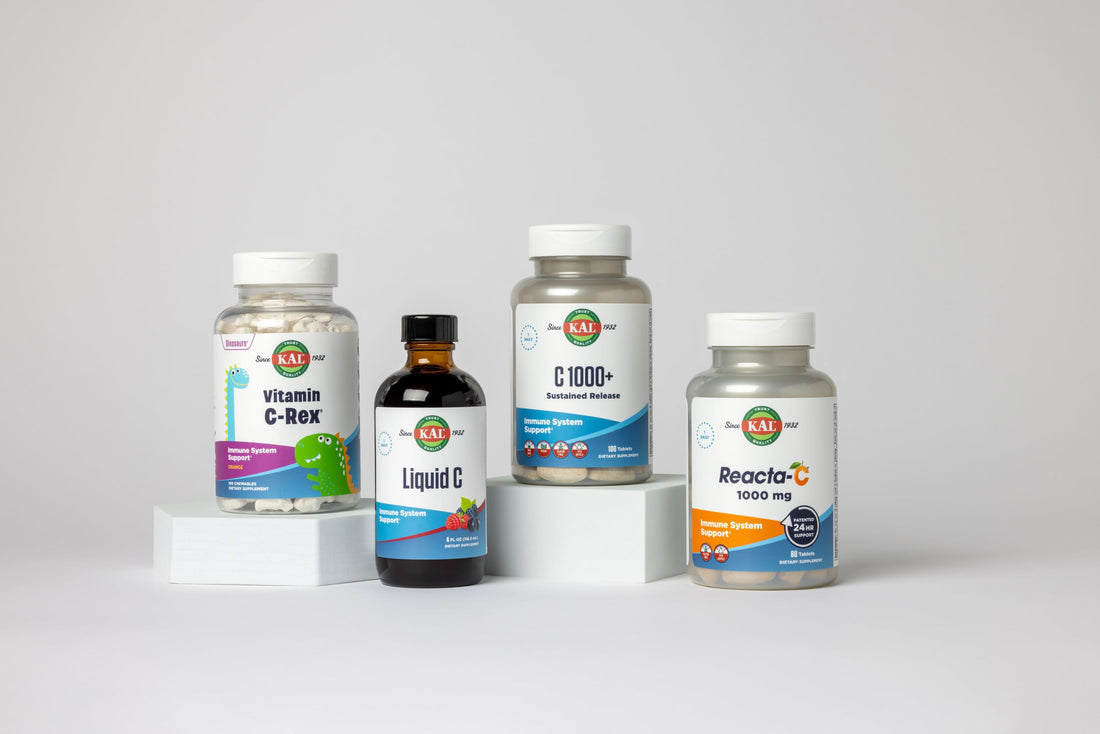
Different Types of Vitamin C and What They Do
Share
What are the different types of vitamin C? What is the best type of vitamin C for my needs?
We’ve all heard by now that vitamin C is good for your health. But what is vitamin C good for? As an essential nutrient, there are many great vitamin C benefits like supporting a healthy immune system and healthy teeth and bones. It’s also an antioxidant, and these are known to neutralize free radicals in the body.
KAL offers many types of vitamin C to give you control over your supplement needs. Below we go over what these different forms are and what they do.
Vitamin C + Bioflavonoids
Bioflavonoids are nutrients, or polyphenols, found in plants like the rind of green citrus fruits. Because they’re antioxidants, they have been traditionally used in alternative medicine to enhance the absorption of vitamin C. Together, they provide a higher level of antioxidants. KAL offers a version in Reacta-C® with Bioflavonoids Tablets, which offer patented 24-hour support and are made without gluten.
Vitamin C + Ascorbic Acid
Ascorbic acid is a type of vitamin C. Though it’s synthetically made, it’s identical to formulations found in nature. This easily accessible form of vitamin C is more affordable than some yet also acidic. It offers the same antioxidant benefits as natural vitamin C. KAL offers this type of vitamin C in the Defender C™ Clinical Lifestyles™ Tablets, which also contain bioflavonoids, elderberry and garlic extract.
Vitamin C + Sustained Release
Sustained Release (SR) supplements are those that release slowly in the body. Many tablets or capsules begin disintegrating immediately and releasing into the body for more immediate effects. Sustained Release supplements release into the body in a slow, controlled state in order to provide the supplement benefits over a longer period of time. KAL offers a version in C 1000 + Sustained Release Tablets, which provides 1,000mg of vitamin C in a vegan tablet.
Vitamin C + Buffered
When vitamin C is buffered, it refers to the acidity levels of the supplement. Buffering happens when vitamin C is combined with “buffering” minerals like magnesium or calcium, which helps stabilize acidity levels. This may be helpful to those who have sensitive stomachs. KAL offers a buffered version C 1000 Buffered Sustained Release Tablets which is also in a sustained release tablet.
How Much Vitamin C Should I Take Daily?
Each body has unique needs, but it’s recommended that women take at least 75 mg of vitamin C per day and men take 90 mg, according to the National Institutes of Health. This changes for those who are pregnant or lactating, and even smokers, who are recommended 35 mg of additional vitamin C per day.
Adults can typically safely consume up to 2,000 mg of vitamin C per day but remember to check in with your doctor before starting a new supplement. Vitamin C is water-soluble, meaning it doesn’t get stored in the body, therefore it’s important to consume it every day to consistently retain all the benefits vitamin C offers.